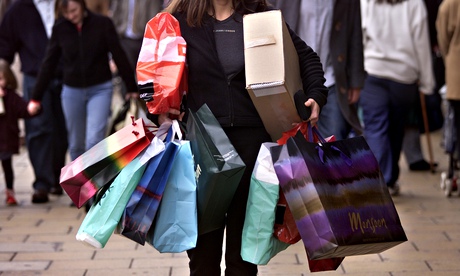
The most revolutionary idea of the 20th century was to create a throwaway culture whose key features were the practice of consumerism and the value system of materialism. It was driven by innovators such as Earnest Elmo Calkins, Edward Bernays and Christine Frederick to solve the problem of overproduction. In it, careful and frugal people became conspicuous, profligate consumers. It solved the problem that had plagued 99% of people for 99% of human history: scarcity.
This new culture of materialistic consumerism has delivered a dramatic, unprecedented rise in living standards. It has given us central heating, smartphones and wardrobes stuffed with clothes.
There are gaps, and many have fallen through them. But for the majority, for the first time in human history, in wealthy western countries at least, our defining problem is not scarcity. It is abundance.
That’s causing a whole set of new problems, which I collectively call “stuffocation”: environmental degradation, species destruction, loneliness, anxiety, stress, depression.
How to solve a problem that is personal, societal and, ultimately, global?
Some want smash-the-system revolutions that are anti-consumerism and anti-capitalism. Think of Occupy, Buy Nothing Day, Russell Brand’s Revolution. Others think technology will save everything.
None of these works for me. Each feels like it would paper over the cracks rather than tackle the underlying causes. As a cultural analyst, it’s been my job for the past decade to forecast the future and work out what will and won’t catch on. I’ve looked around the world for exciting, realistic alternatives to materialistic consumerism. And I’ve found a way of living that can and will solve the problem.
I call this solution “experientialism” and the people who live this way “experientialists”: instead of looking for happiness, identity, status and meaning in material things, like materialistic people do, they find them in experiences.
Experientialism, I think, is the opportunity of our era. Just as materialism and the consumer revolution transformed standards of living in the 20th century, so I believe experientialism and an “experience revolution” can transform quality of life in the 21st century.
If we all – people, politicians, business – embrace this idea, we’ll lead better, happier, more sustainable lives on a less damaged planet. The advances in quality of life that this will bring might sound, today at least, like wishful thinking: less stuff, less stress, less work, more enjoyable work, longer holidays, a shorter working week. Because who decided that five days on, two days off, and four weeks holiday a year should be the peak of human achievement?
If that sounds like crazy talk, think how today’s world would have sounded to someone a few generations back. Would someone in 1915 have believed that one of the greatest worries for most people isn’t finding enough food to feed the family, but there being so much food that we have the obesity epidemic? Could she have imagined a map that not only knows where you are but can tell you where to go next? If material, standard-of-living leaps like these were possible in the 20th century, why aren’t experiential, quality-of-life breakthroughs also likely in this century?
The good news is it’s already happening. You can see it in the rise of the sharing economy and the experience economy. You can see it in the government’s increased interest in wellbeing. Witness the What Works Centre for Wellbeing launching this spring and the wellbeing measures (and remember what Joseph Stiglitz says: “What we measure affects what we do”).
You can probably see it in your own attitude too. Where once many of us were impressed by what a person had, now we’re more likely to be interested in what they do. What impresses you more, for instance: someone who has a fancy watch or handbag, or someone who’s climbed Kilimanjaro, completed a Tough Mudder course or been to a Secret Cinema event?
I’m going to share something with you, a secret of sorts. When I first came across the idea of experientialism, I was writing about it cold, as an analyst. But as I researched the book, I discovered two key pieces of information that changed that.
First, I read some research by two psychologists at UCLA, Rena Repetti and Darby Saxbe, which shows that too much stuff, and the stress that comes with all that stuff, is really bad for your health. Second, I came across another study, by another pair of psychologists, Leaf van Boven and Tom Gilovich, that proves experiences are more likely than material goods to lead to happiness.
After that, I realised I didn’t just want to be a futurist. I felt like I had to share these insights and become an activist. So now I think of “experience revolution” not only as a useful term for this cultural shift, but as a manifesto for change – a bit like Jamie Oliver’s Food Revolution. But instead of helping people be healthier by nudging them to eat less unhealthy food and more healthy food, this experience revolution will help people be happier by nudging them to spend less time and money on having things, and more of their time and money doing things.
Less stress, more happiness and a transformation in quality of life that’s easy to implement and for everyone – sounds like a revolution worth embracing, doesn’t it? And you already know what to do if you want in: spend ever less of your time and money on stuff, and ever more on experiences instead.

